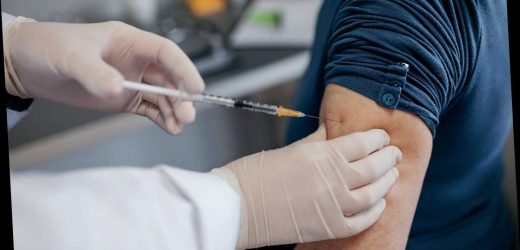NEW Covid vaccines to fight variants will be fast tracked for approval, the UK regulator has said.
The approach will follow a similar process as the annual flu vaccine, the Medicines and Healthcare products Regulatory Agency (MHRA) said.
? Read our coronavirus live blog for the latest news & updates…
Scientists modify the influenza jab to deal with new strains every year without the need for new approval.
Experts have previously said a vaccine-resistant Covid variant is likely to emerge at some point – but jabs can also be adapted quickly.
It comes after six cases of the worrying Brazil variant, known as P1 were detected in the UK – with one person yet to be tracked down.
Research by the University of São Paulo, in collaboration with British universities, shows the variant, called P1, is between 40 per cent and 120 per cent more transmissible.
The variant also appeared to have a higher death toll in those who caught it in Manaus.
Experts are also concerned about the South African variant, which has been detected in the UK and sparked surge testing in areas.
While the UK's own Covid mutation, known as the Kent variant, is now the dominant strain in the country.
MHRA chief executive Dr June Raine said there is no evidence that current vaccines are lacking effectiveness against known coronavirus variants.
She said during a briefing with Health Secretary Matt Hancock: "Since December last year we have all been concerned about the appearance of variants – Kent, South Africa, more recently Brazil – and therefore we're well-prepared to look at, when it's needed, updates to ensure the vaccines being used in citizens are fully effective.
"Our goal is to ensure that the vaccine modifications in future that respond to the new variants can be available in the shortest possible time but without compromising in any way on safety, on quality and on effectiveness.
"What I would emphasise at the outset is that we don't have evidence at the moment that the vaccines in use in the UK are significantly lacking in effectiveness but we are now well-prepared."
During a visit to Glasgow Lighthouse Lab today, Health Secretary Matt Hancock, said: "The vaccine programme has clearly been a huge UK success story.
"Part of the reason that we have been able to develop the vaccines so far so quickly is because of the MHRA's rigorous yet flexible approach, which has been based entirely on looking as quickly as possible at the safety and efficacy of vaccines.
"I'm delighted that they're taking that same principled approach to the approval process for vaccines that may work against variants."
BETTER POSITION
The new guidance states manufacturers will need to provide robust evidence that the modified jab produces an immune response.
However, lengthy clinical studies deemed not to add to the regulatory understanding of their safety, quality or effectiveness will not be needed.
The MHRA said researchers are in a better position to measure protection by looking at antibodies in the blood after vaccination.
This slashes the need to wait and see whether or not people in a trial become infected with the virus.
It said this will "significantly reduce" the length of time it takes for the modified vaccine to be ready.
Dr June Raine explained that the coronavirus vaccine modifications will follow a similar authorisation process as flu jabs variants.
She said those which have been authorised but need to be modified for new Covid-19 strains will not need a "brand new approval".
"Of course there will be checks on manufacture, on safety, on quality, but we will be using the approach that's been very successful for flu jabs," she said.
"Every year there's a tried and tested regulatory process for the seasonal flu vaccines so that they match the strains circulating each year."
The guidance is from the Access Consortium – a group made up of regulatory authorities from the UK, Australia, Canada, Singapore and Switzerland.
It also says that, as well as evidence on immune response, the modified vaccines must be shown to be safe and of the expected quality.
Data from the original clinical trials and ongoing studies on real-world use in millions of people could also be used to support any decision by the regulators, it adds.
NO COMPROMISES
Dr Christian Schneider, chief scientific officer at the MHRA, said: "Our priority is to get effective vaccines to the public in as short a time as possible, without compromising on safety.
"Should any modifications to authorised Covid-19 vaccines be necessary, this regulatory approach should help to do just that.
"The announcement today also demonstrates the strength of our international partnerships with other regulators and how our global work can help ensure faster access to life-saving vaccines in the UK and around the world.
"The public should be confident that no vaccine would be approved unless the expected high standards of safety, quality and effectiveness are met."
Meanwhile, research has suggested the rate of decline in Covid infections in England has slowed.
New data indicates that in some parts of the country the rate has flatlined while in some places there are hints that it is increasing.
One in every 213 people is still testing positive for Covid-19, the Imperial College London React study found.
Researchers warned that infection rates need to get as low as possible to give the vaccination programme the best chance of working.
The study also suggested that some professions have had higher rates of infection than others during the national lockdown – including teachers and transport workers.
The latest Government data – up to March 2 – shows that 20,703,615 first doses of vaccine have been administered so far in the UK.
Source: Read Full Article






